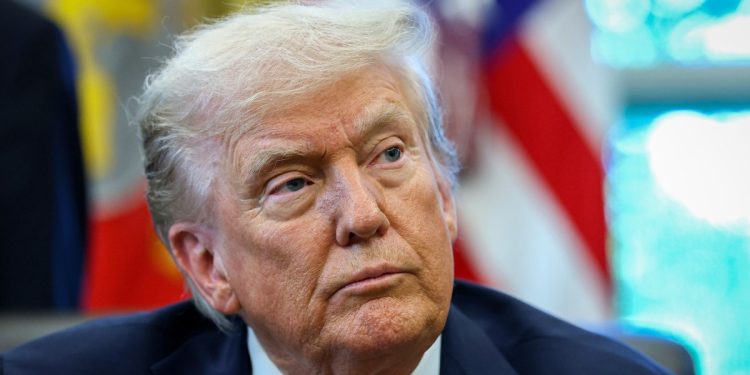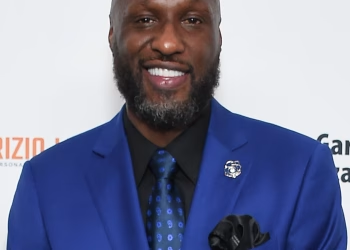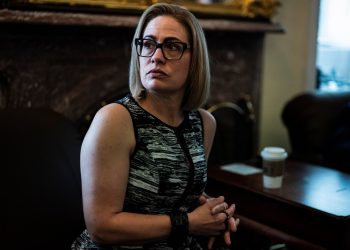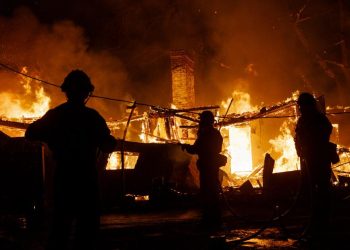WASHINGTON — White House officials have had increasingly serious discussions in recent days about President Donald Trump’s invocation of the Insurrection Act, a rarely used 19th-century law that gives the president the authority to deploy active-duty troops inside the United States for law enforcement purposes, five people with knowledge of the talks told NBC News.
The discussions come as Trump has sought to deploy National Guard troops to several major cities — including Los Angeles, Chicago and Portland, Oregon — saying they are needed to reduce crime and protect Immigration and Customs Enforcement agents from protesters. Critics said the Trump administration was exaggerating the problems in these cities.
A decision to invoke that law is not expected to be imminent, a senior administration official said. If this happened, it would be a notable escalation. The Guard is currently deployed in limited support roles because active-duty military members are prohibited from conducting civilian law enforcement actions, such as conducting searches and making arrests. But the Insurrection Act authorizes the president to deploy troops for this purpose on American territory.
Trump’s plans to deploy the National Guard sometimes face legal obstacles. A federal judge in Oregon on Sunday blocked the president from sending Guardsmen from any state to Portland. The next day, Trump publicly stated that he would invoke the Insurrection Act “if necessary.”
“If people were being killed and the courts were holding us back, or the governors or the mayors were holding us back, of course I would do it,” Trump said. For now, he said, that’s not necessary.
Discussions at the White House about invoking the law have fluctuated since Trump took office in January, said the five people, including the top administration official, two people familiar with the discussions and two people close to the White House.
But the debate within the administration has recently shifted from whether it makes sense to invoke the law to looking more closely at how and when it might be invoked, the two sources close to the White House said.
Administration officials have drafted legal defenses and various options for invoking the law, two of the people said.
But the current broad consensus among the president’s aides is to exhaust all other options before taking that action, said the senior administration official and one of the people close to the White House.
The person close to the White House described the process as a progression toward “a ladder of escalation.”
Asked about discussions about invoking the Insurrection Act, White House Press Secretary Abigail Jackson said in a statement: “The Trump Administration is committed to restoring law and order to American cities that are plagued by violence due to Democratic mismanagement. And President Trump will not stand idly by while violent rioters attack federal agents responsible for law enforcement. The administration will work to protect federal assets and agents while making America’s cities safe again.”
The law gives the president broad discretion regarding its invocation. It can be invoked at the request of a state or when the president determines that conditions such as “unlawful obstruction,” “rebellion,” or “insurrection” have made it difficult to enforce the law. During the civil rights era, three presidents – Dwight D. Eisenhower, John F. Kennedy and Lyndon B. Johnson – used this law to protect activists or to enforce court orders requiring desegregation. It was last used, at the request of the governor of California, during the Los Angeles riots in 1992.
The governors of Oregon and Illinois both oppose sending troops to their states. There are no riots and authorities are not defying court orders.
The White House expects any potential invocation of the law to face rapid legal challenges and ultimately end up in the Supreme Court.
Last month, a federal judge ruled that the White House’s deployment of active-duty troops to Los Angeles in June was illegal under the Posse Comitatus Act, a 19th-century law that prevents the military from being used as police. After the decision, administration officials restarted discussions and internal legal analysis around invoking the Insurrection Act, according to two people familiar with the discussions and a person close to the White House.
But Trump was warned that under current circumstances it might not hold up before the Supreme Court, which would end his winning streak, these people said, and the idea was postponed for some time.
A White House official declined to discuss specific deliberations but said the president’s legal team was focused on crafting a legal path that could withstand judicial scrutiny.
“At the end of the day, it’s the president’s vision and the president’s policies that he was elected to pursue that lawyers are working hard to defend,” the White House official said. “We’re working hard to look at the law and determine, ‘How can we achieve the president’s vision?’ » »
Trump considered invoking the law during his first term during protests after the killing of George Floyd in 2020. He declined despite pressure from some allies and later regretted the decision, according to the senior administration official. He views his current decision in that light, the senior administration official said.
One of Trump’s deputy chiefs of staff, Stephen Miller, has long been a leading proponent of invoking the Insurrection Act. Miller has been at the center of discussions on the issue since Trump took office, said the five sources and another person familiar with the discussions.
Administration officials have considered invoking the law if local law enforcement can’t or won’t protect ICE and federal law enforcement agents, one of the people familiar with the discussions said.
But one concern raised by some officials is that invoking that law could eventually lead to pitting active-duty U.S. troops against other Americans, this person said.
Trump has stepped up his use of the word “insurrection” to describe developments in Portland and Chicago in recent days. On Monday, he said opposition to ICE agents’ attempts to conduct immigration enforcement operations in the two cities constituted a “criminal insurrection.”
Trump and Miller described protesters against ICE operations in Chicago and Portland as participating in organized violence against the federal government.
“They’re saying they’re going to wage an insurrection against the federal government using force, obstructive force, to prevent ICE agents from going out and making arrests,” Miller told reporters Monday. “This is a campaign of total insurrection against the sovereignty of the United States because the Democratic Party and those who commit violence in this country do not believe in the legitimacy of the sovereign territory of the United States. »









